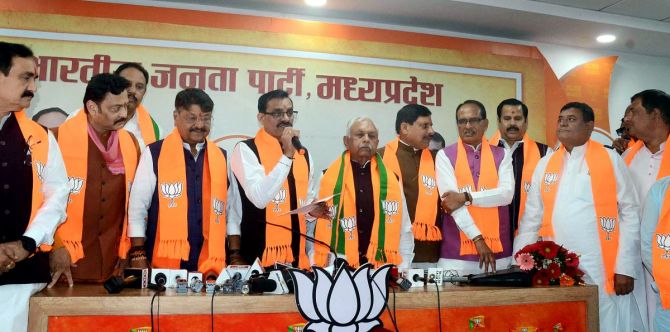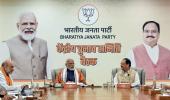If the party's members aren't sure what it stands for, see no path to wealth or power, and endure control by a dynasty, which, almighty as it is within the party, cannot get them the votes, they are likely to explore options, notes Shekhar Gupta.

The cross-voting and defections in the Rajya Sabha elections in Himachal Pradesh, Uttar Pradesh and Karnataka raise important questions.
What makes politicians stay loyal to a party or leave it?
Why do some parties stay together and others split?
What's the glue that keeps parties together, and what is it that makes them lose cohesion?
Let's anticipate the obvious answers. First up, of course, it must be power and money that make people stay or leave.
It must also be the glue that keeps parties together or the magnet that pulls people away. Sorry to disappoint you, but that isn't true.
Because if it were so, why would the Bharatiya Janata Party (BJP) have remained the most cohesive national party in India?
It stayed intact even when reduced to two seats compared to the Congress's 414 in 1984.
The BJP rose in 1980 as the new avatar of the original Bharatiya Jana Sangh (BJS). Even the latter had stayed together through decades in the political wilderness.
Between 1947 and 1989, neither this party nor its successor had even a sniff of power at the Centre, barring 28 months in 1977-79 as a constituent of the Janata Party.
See it this way: The BJS subsumed itself in Janata and all its members dutifully acquiesced.
The obvious argument might be, "Of course, they did it for power".
But it is flawed. Because soon after power was lost, all Jana Sangh natives regrouped as the BJP.
None went to the Congress or floated their own party. The tempting conclusion: Ideology keeps parties together. Now, we shall challenge it.
I brace myself for some counters here. Haven't people been leaving the BJP/Jana Sangh?
Yes, Balraj Madhok and some others left in the early 1970s protesting against a rising personality cult.
But they didn't defect to the Congress, however much Mrs Gandhi would tempt them.
More contemporarily, Shankersinh Vaghela, Kalyan Singh, Uma Bharti and B S Yediyurappa left and formed their own small parties.
Only the first joined hands with the Congress to become chief minister, and that was in 1996.
He has since left the party and is now praising Narendra Modi.
The last three returned "home" to the BJP. The BJP is the only national party not to have any hyphenated offshoots.
Indian politics, however, wouldn't be a fraction as fascinating if it did not defy any idea that seemed obvious or an answer that began with "of course".
If ideology kept parties together, how come the Socialist Party in India has seen the most splits, the initial factions parting ways under individual founders?
The Socialists had an ideology, and within this, there was also a more sharply defined one: Lohiaism.
Now count the factions into which the Lohiaites have split and the different directions they have chosen.
Nitish Kumar, Ram Vilas Paswan, Mulayam/Akhilesh, Lalu/Tejashwi. Keep counting.
Alright, we have another choice that looks so obvious. The BJP core leadership wasn't poor, they were mostly well-to-do, schooled by the RSS and, therefore, deeply indoctrinated.
So, of course, what keeps parties together is financially comfortable personal lives and ideological commitment.
Plus, a sniff of power, which the BJP has had from 1989 onwards. But if it's so obvious, what explains Indian Communists?
Communist party members also almost never defect. What keeps them loyal, if not ideology, given that they rarely get power and never personal wealth?
This doesn't pass the "obvious, of course" test either. Because while Communists do not defect, they split. Not for power or money.
They split in search of ideological purity, over profound arguments like who to follow: Lenin, Mao, Trotsky, Moscow or Beijing?

It must be powerful personalities and dynasties, then, that keep parties united and attract new "talent" to them.
Check out Narendra Modi's BJP, Stalin's DMK (with a sharp ideology, though confined to one state) and Mamata Banerjee's TMC on the outside, because they've seen some people leave.
But list all other personality/dynasty-run parties and you will find desertions, whether in Mayawati's BSP, the Shiv Sena, Sharad Pawar's NCP or the Badal family's Shiromani Akali Dal. We aren't left with much wisdom.
This brings us back to the most important question for today's context: The failure of the Congress to keep its flock together.
It claims to have an ideology and one leader/dynasty.
When leaders, from Himanta Biswa Sarma to Jyotiraditya Scindia, leave it, they're dismissed as not being true to its "vicharadhara".
It has some power and patronage to dispense, though it's declining. On having a strong personality/dynasty at the top, it scores 10/10.
Yet, it is haemorrhaging talent. It has even seen one of its chief ministers (Pema Khandu, Arunachal Pradesh) walk across to the BJP with the entire legislature party.
That its ideological commitment is flaky is evident in how easily many of its key figures move to the BJP.
Can it all be blamed on the rather unique "charms" of the Modi-Shah BJP, along with money, power and protection from "agencies"?

That isn't so obvious either, because the party has been splitting every few years since 1969.
The last big one came in January 1978 as its senior-most leaders failed to endure even a few months out of power.
These included D K "Indira is India" Barooah, Vasantdada Patil, Y B Chavan and Swaran Singh.
Later, A K Antony, that eternal family loyalist (didn't you think so?) joined the Congress (Urs) and then went on to form his own Congress (A).
Charan Singh, Sharad Pawar, Y S Jagan Mohan Reddy, Mamata Banerjee and Himanta Biswa Sarma -- all have built their own political power as the "mother" party declined.
The upshot? First, ideology can be the glue if it is sharp and drummed into people's minds from a young age, as with the BJP/RSS, the Communists and the Dravidian parties.
A strong personality or dynasty can keep things together but only as long as they can guarantee votes for their followers.
That's the power of a Jagan in Andhra or Mamata in Bengal. Promises of wealth and power can add to your ranks, as the BJP shows today.
The Congress failed all of these tests. Its ideology is flaky.
It pretends to be JNU-Left secular but also flaunts its "Shivbhakt" leader's "janeudhari" (sacred-thread-wearing) Dattatreya Brahmin identity, while at the same time turning down the invitation for the temple consecration at Ayodhya.
Its Left pretences on the economy and the railing against Adani, Ambani and the "handful of rich men" who own India don't wash given its history with the same oligarchs.
If the party's members aren't sure what it stands for, see no path to wealth or power, and endure control by a dynasty, which, almighty as it is within the party, cannot get them the votes, they are likely to explore options.
This is what happened to the Congress in Shimla and to its ally, the Samajwadi Party, in Lucknow last week.
The BJP, on the other hand, is a formidable package: Ideological Fevicol for the native, power and protection for the incoming defector, and a "Modi ki Guarantee" of votes.
This is how national politics stacks up on the eve of general elections.
By special arrangement with The Print
Feature Presentation: Aslam Hunani/Rediff.com











